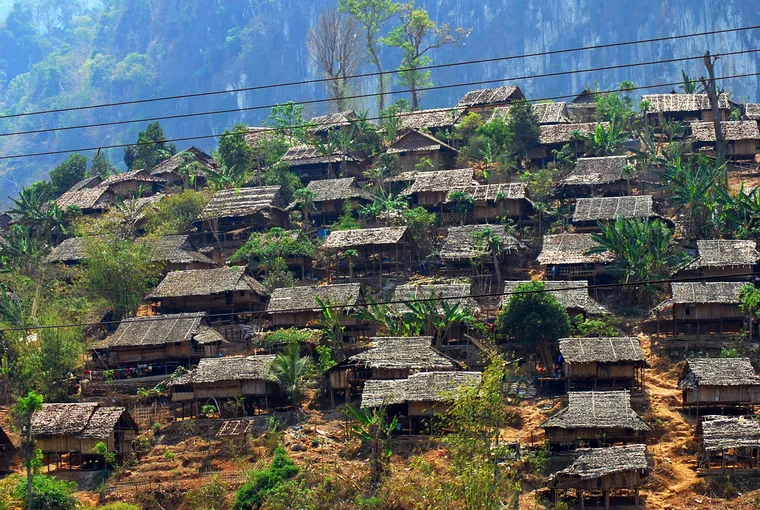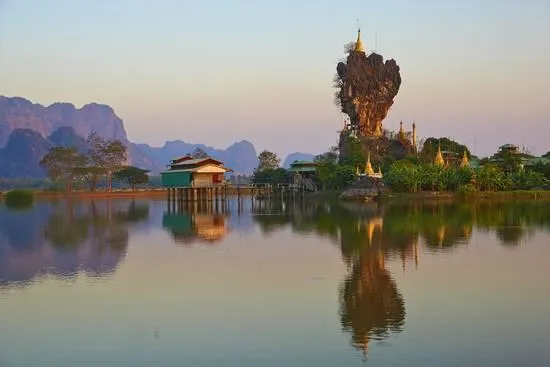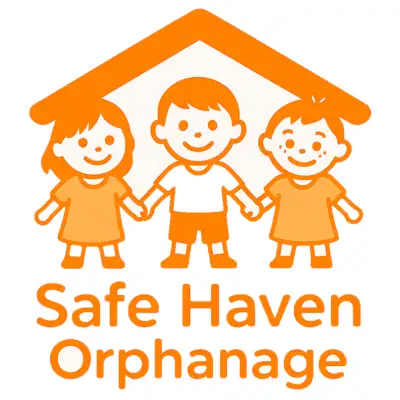Background on Burma
As the majority of the Safe Haven Orphanage children have been affected in one way or another by the situation in neighbouring Burma, we have provided some background on the Burmese situation below.
A Brief History of The Karen and Their Insurgency
The Karen are an ethnic minority from what is today called Myanmar (Burma). Accepted theory has their ancestors descending south from present day Mongolia in the 7th century. Rather than look at Burma as a country, we must see it as it was for hundreds of years, a large land mass split into many territories. Each territory was controlled by different tribes, The Mon, The Karen, The Shan, The Karenni, The Burman (hence the name Burma) and many other smaller tribes. All the tribes were virtually isolated from each other with little to no interaction.

Mae La is a refugee camp established in 1984 in Tha Song Yang District on the Thai/Burma border. It has a population of approximately 45,000 people.
When The British came in the early 19th century to colonize the integration process began. As with all of its colonies, The British set up a representative government, with the majority Burman holding the most power. They set up borders and what had been just territories was now the western notion of a country, with borders and a central government. This system lasted for well over a hundred years and Burma was officially recognized as a country in 1937, while the British plundered Burma's vast resources of wood.
With the onset of World War II, Burma would become a vital role-player in the fight between the British and the Japanese. The Japanese, seeing a back door in to India, invaded Burma and quickly gained an ally in the Burman who wanted the British to hand over power to them. The Karen agreed to fight with the British with one caveat, that at the end of the war they would be granted their own Karen state.
As the war ensued, the Japanese were driven back by the fierce guerilla tactics of the Karen soldiers. During their retreat the Japanese burned villages and indiscriminately slaughtered civilians. With the Japanese routed in Burma, and the end of WWII on hand, the British finally granted Burma its independence in 1948. The only problem, they forgot their promise to The Karen, and handed complete control of the country over to the ethnic Burman. This would be the beginning of The Karen insurgency, a fight for independence that has lasted for over fifty years.
As is the case with any society not fully prepared for the social and economic responsibilities that come with independence, Burma's fledgling democracy was decimated by corruption and ineptitude. This was the best chance for The Karen and their newly formed government, The KNU (Karen National Union), to seize their independence. They made it as far as the outskirts of Rangoon, but they would not attack a city full of civilians. So they waited, and were finally pushed back. They would never get so close again.

Kyauk Kalap Monastery, Hpa-An, Karen State.
In 1963 the crumbling democracy folded with the military coup orchestrated by the general Ne Win. He took absolute command, inverted the country and began a process of oppression second only to Pol Pot within southeast Asia. He made it a priority to crush The Karen rebellion and only by a minor miracle has The KNU survived. All the while through his greed, brutality and insanity Ne Win managed to make the once resource rich country in to one of the top five poorest in the world. The people finally had enough, and in 1988 they rose up and demanded democracy. They were led by the daughter of the original democracy movement and national hero Aung San Suu Kyi, scores would be killed but the government finally took notice.
The government finally allowed elections in 1990; they felt that the population would be too scared to vote against them, they were wrong. Aung San Suu Kyi and her NLD (National League for Democracy) party took an astounding 82% of the vote. Things were poised for change and The Karen finally had hope for peaceful independence talks. This would not be. The government refused to hand over power, forced The Nobel Peace Prize winner Aung San Suu Kyi into house arrest, and installed an even harsher government. They formed the SPDC (ironically called the State Peace and Development Council), whose brutal tactics are unmatched. They sent hundreds of thousands Karen fleeing across the Thailand border into refugee camps, in search of safety.
The SPDC are known to use slave labor and child labor. It is also reported that the government itself is responsible for most, if not all of the booming drug trade The Karen are not safe in their own country, and only still control small sections that foreigners refer to as “free Burma”. The Karen in the refugee camps have no citizenship to any country, and no rights afforded to citizens, with international NGO's as their only source of food. This is their story, and their only request is that they be given the land that has been theirs for hundreds of years. Only through education and international awareness will this dream be possible.
For a more detailed understanding on the situation in Burma, please see this paper , courtesy of the Karen Human Rights Group.

